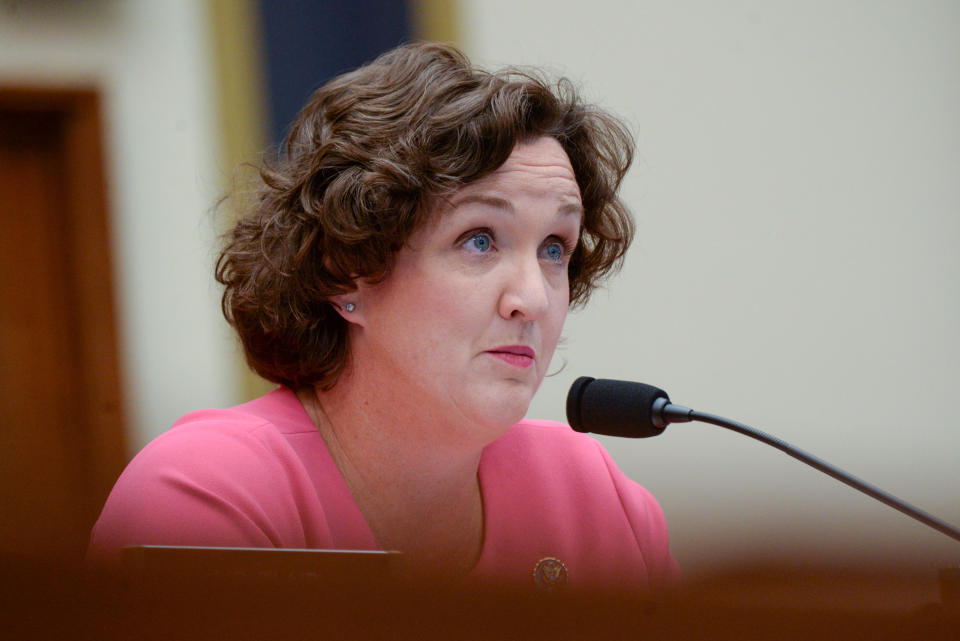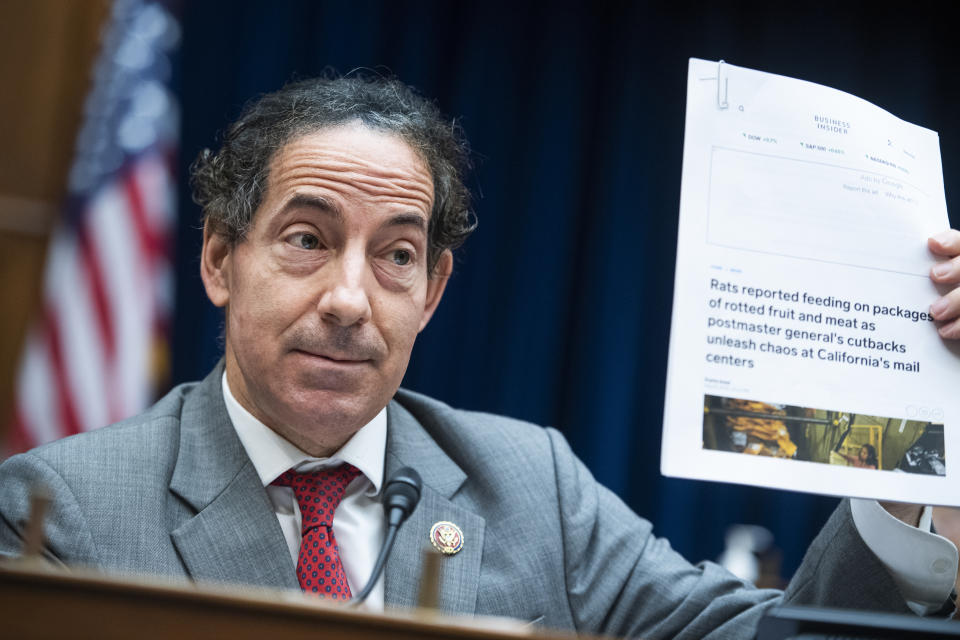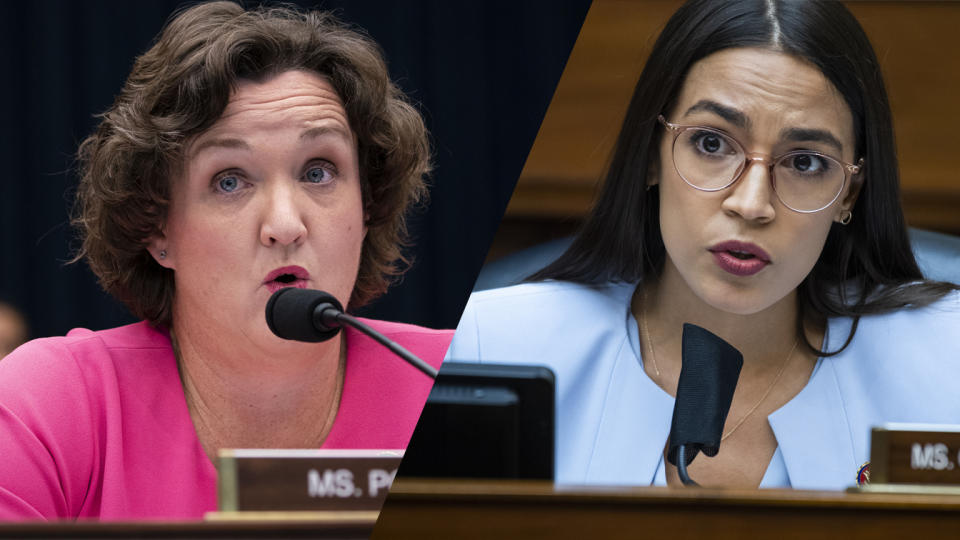Katie Porter, AOC among House freshmen making their mark by grilling witnesses
Last month, embattled Postmaster General Louis DeJoy’s House Oversight Committee hearing was in its fifth hour when Rep. Katie Porter’s five minutes to ask questions arrived.
“Mr. DeJoy, thank you for being with us today,” Porter, D-Calif., began. “What is the cost of a first-class postage stamp?”
DeJoy knew the price of the stamp — 55 cents — but was unable to answer Porter’s questions about the cost to mail a postcard, priority mail shipping rates and the number of Americans who voted by mail in the last presidential election.
“I’m glad you know the price of a stamp, but I’m concerned about your understanding of this agency,” Porter said as she moved the questioning to her real concerns after that opening salvo. “And I’m particularly concerned about it because you started taking very decisive action when you became postmaster general. You started directing the unplugging and destroying of machines, changing of employee procedures and locking of collection boxes.”
DeJoy said the changes that had caused slowdowns in mail delivery started before he took over the agency, and Porter turned to questions about who had ordered the changes (he didn’t know), whether he’d reverse them (no), whether he would commit to resigning if the inspector general found evidence of misconduct with his other businesses (he wouldn’t) and if he had any financial interests in Amazon (again, no).
The Aug. 24 hearing was the latest example of a trend that congressional observers have noted this term: Junior representatives like Porter and Alexandria Ocasio-Cortez, D-N.Y. are using their time to ask hard questions of witnesses, seeking actual answers, while more senior members are more inclined to play to the cameras, delivering speeches or lectures.

Savvy observers have learned that the best time to listen to congressional hearings is toward the end, when the lower-ranking members get their time to ask questions.
The postal chief was only the latest in a group of witnesses who found themselves under uncomfortable scrutiny from Porter, a freshman representing Orange County. A former student of Sen. Elizabeth Warren at Harvard Law School and law professor herself at the University of California- Irvine, Porter wrote the textbook “Modern Consumer Law” and served as California’s independent bank monitor before she won a seat in her generally Republican district in 2018.
Porter told Yahoo News that she has already had a few colleagues ask for advice on her approach to preparing for hearings. She said the most important thing is to define what you want to learn.
“What do you want to know from this witness?” she said. “It could be whether they understand a certain thing or who’s responsible for something, what their opinion is. ... Start with the outcome you want to get to. And then you come up with lines of questioning that will get you there. That can look different depending on what you’re trying to get.”
Porter also recommends the judicious use of props such as a whiteboard to illustrate her points, helping both the witness and observers follow her line of questioning.
“Make sure you’re asking questions,” she continued. “I know that sounds silly but many, many of my colleagues will spend between two and four and a half minutes giving a speech, and they’ll wrap up their speech and they’ll say, ‘Do you agree?’ Well, with what? You’ve been talking for four and a half minutes.”
Rep. Jamie Raskin, a second-term Democrat from Maryland, said the debate over which questioning strategy to employ has come up in caucus seminars, which he helps arrange as a representative of the junior classes.
“Pre-COVID, I was doing monthly meetings on different subjects of interest to junior members, and I had a special seminar on asking effective questions in hearings,” Raskin told Yahoo News. “All of the people I asked to speak agreed that making a speech is the least effective way to go. We have lots of opportunities to make speeches [on the House floor]; there are different opportunities to orate. I have seen some effective speeches where people will use their time to express outrage about this or that, outrage committed by the administration, but the problem is that people quickly experience outrage fatigue. I think it fails to work more than it works. The people higher up on the dais can make speeches expressing outrage early on during the hearing, and it’s not so wearying, but [if] you get a speech like that an hour or two into it, it falls on deaf ears.”

Raskin noted that the hearings in Washington are “a completely different art form” than his experience as a Maryland state senator. In Annapolis, there was no limit on time, and hearings were designed to aid in the writing of legislation, while the hearings in the U.S. Congress are “either meant to draw battle lines or meant to unearth damaging facts about how government is working.”
“It’s a very tough thing to change public understanding and perception in five minutes, especially when you’re interrupted and it’s over the course of a very long day, so it’s a rare art form,” Raskin said. “Katie Porter is special because she has the ability to ask deceptively simple questions that expose entire systems of thought and power.”
In March, Porter pushed Centers for Disease Control and Prevention Director Scott Redfield to commit to free coronavirus testing for all Americans while working out the total cost of testing on a whiteboard as she asked her questions. (Some Americans are still being billed for the testing, an issue on which Porter has continued to push the administration.) A video of the exchange that was posted to Porter’s Twitter account has nearly 30 million views and has helped to further elevate her profile.
“If you haven’t watched this video, please do,” wrote actor Chris Pratt to his 7 million followers in a retweet of the video. “I’ve never heard of this woman before. But I’m damn glad she’s up there doing her job for all of us.”
The objects of Porter’s high-profile grillings include Housing and Urban Development Secretary Ben Carson and Consumer Financial Protection Bureau Director Kathy Kraninger, during which Porter used her own textbook as reference. Porter said one line of questioning she was particularly proud of was the April 2019 hearing with JPMorgan Chase CEO Jamie Dimon, in which the billionaire was unable to answer her questions about how a full-time employee at one of his banks would be able to make ends meet.
“That prompted a lot of discussion about who I was representing,” said Porter. “I question on behalf of a worker, and that began a powerful conversation about whose perspective do we bring to this hearing. Of course, we always bring our own perspective as part of it, but to say how would someone in this situation deal with it is different from saying, ‘Here’s what I as a representative experience.’”

Porter attributed part of her early success in hearings to her experience on the other side of the room in her time as a witness advocating for consumer protections and dealing with lengthy speeches that barely qualified as questions from the sitting legislators.
“I had been a witness testifying before Congress, so I had a little more familiarity with that part of the work, and so I went into it really thinking it was important that I ask good questions,” Porter said. “And having been a witness, I had been on the receiving end of these five-minute speeches or questions that had been asked of prior witnesses — so why are you asking again? I had a sense in the way these hearings weren’t effective, and having been a witness, I felt like I wasn’t able to get important information across to the committee that they needed to know.
“I think for too long people have not been willing to call out special interests, to call out those in power, to ask questions in a fair but tough way,” Porter continued when asked if it was frustrating that some witnesses hadn’t seemed to take the time to properly prepare for their appearances. “I think that hopefully this trend is going to help people [realize] that they’re not just speaking to congresspeople, they’re speaking to the American people when they testify before Congress. ... In a democracy, whether you’re appointed or elected, you should have a lot of respect for those that you’re serving, and that includes preparing and being honest.”
Porter isn’t the only freshman representative who has made an impact with her questioning. Ocasio-Cortez has already made headlines and racked up millions of views for her questioning of Facebook CEO Mark Zuckerberg over the site’s willingness to allow misinformation, confronting of an FBI official about the labeling of white supremacists as terrorists and having Federal Reserve Chairman Jerome Powell agree with her that the country’s monetary policy kept too many people unemployed. Last month, the Fed announced a major policy shift in its approach to inflation tied to Powell’s comments.
Ocasio-Cortez’s five minutes also led to the opening of a fraud investigation into President Trump’s businesses. In February 2019, the congresswoman’s second month in office, she walked Trump’s former personal attorney Michael Cohen through explaining how the Trump Organization allegedly committed fraud by inflating the value of assets for insurance and loan purposes. In August, New York State Attorney General Letitia James filed legal action against Trump’s businesses to investigate those claims. James said they began looking into the Trump Organization in March 2019, following Cohen’s testimony.
Ocasio-Cortez’s legislative team told Yahoo News that for House Financial Services hearings they coordinate with other progressive legislators, including Porter and Reps. Rashida Tlaib, Ayanna Pressley and “Chuy” Garcia, to ensure no overlap in topics. For Oversight, it’s a team effort on each hearing from the start.
Following the DeJoy hearing last month, Ocasio-Cortez used Instagram to explain her process of preparing for a House Oversight hearing, showing off the collection of Post-it notes she uses to arrange potential paths of questioning.
“The psychology of my witness shapes my style and approach for the day,” Ocasio-Cortez said. “I study them throughout the hearing or in their previous videos. I adapt my words and vibe to complement the situation. The goal is not to yell or make a point. It’s to get desired results.”
The congresswoman attributed her performance in the setting to one of her prior professions.
“Where did I learn and refine this psychological skill set?” Ocasio-Cortez continued. “Bartending. The dais is a literal wood bar between me and the witness.”
Social media is a relatively new factor that legislators from both sides of the aisle can take advantage of, as news outlets, staff members and activists from across the political spectrum can quickly cut clips of questioning and get them posted to platforms in a matter of minutes.
“I think there are more ways for people to watch in real time or after the fact than there were 20 or 30 years ago, when they were simply broadcast on C-SPAN,” Porter said. “When you think back further than that, the best you could get is to read about it later, maybe, in the Congressional Record or the Federal Register. So I do think there’s an increased opportunity for the American people to watch their representatives fight for them — to watch their representatives do the work of oversight, to do the work of gathering information that helps them make better law. I think it’s a positive thing that more people are able to watch that.”
Leadership in Congress, particularly in the House Democratic caucus, could be viewed as a gerontocracy. House Speaker Nancy Pelosi is 80 years old and has served in the House since 1987. Her chief deputy, Majority Leader Steny Hoyer, is 81, and the majority whip, Rep. James Clyburn, is 80. Their relatively moderate views, and those of most committee chairpersons, set the legislative agenda, but the five minutes of questioning allotted to each committee member at hearings allow other viewpoints to be expressed, leveling the ideological playing field.
“You know as a freshman, there is so much in Congress, particularly in the House, that is driven by seniority, and different limits that come from what committees you’re on, what caucuses you’re in, even what states you represent,” Porter said. “The hearing is really the great equalizer. Everybody gets five minutes. The most senior member, the most junior member. So while it was clear I wasn’t going to be presiding over the caucus or necessarily getting every legislative opportunity, every single hearing gives me an opportunity to do work for Orange County.”
The raising of a profile via congressional hearings is not limited to the House, as another Californian serving her first term in Washington, D.C., found out over the past four years. Sen. Kamala Harris was first elected in 2016, but her path to the vice presidential spot on the 2020 Democratic ticket was smoothed by her incisive questioning of Trump appointees, including Attorneys General Jeff Session and William Barr. Her most memorable conflict came in the contentious confirmation hearings for Supreme Court nominee Brett Kavanaugh, during which her line of inquiry made an impression on at least one prominent figure in American politics.
“So I was a little surprised he picked her. I’ve been watching her for a long time, and I was a little surprised,” President Trump said after Joe Biden announced Harris as his running mate. “She was extraordinarily nasty to Kavanaugh — Judge Kavanaugh, now Justice Kavanaugh. She was nasty to a level that was just a horrible thing, the way she was, the way she treated now Justice Kavanaugh. And I won’t forget that soon.”
_____
Read more from Yahoo News:

 Yahoo Home
Yahoo Home 

